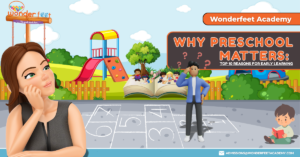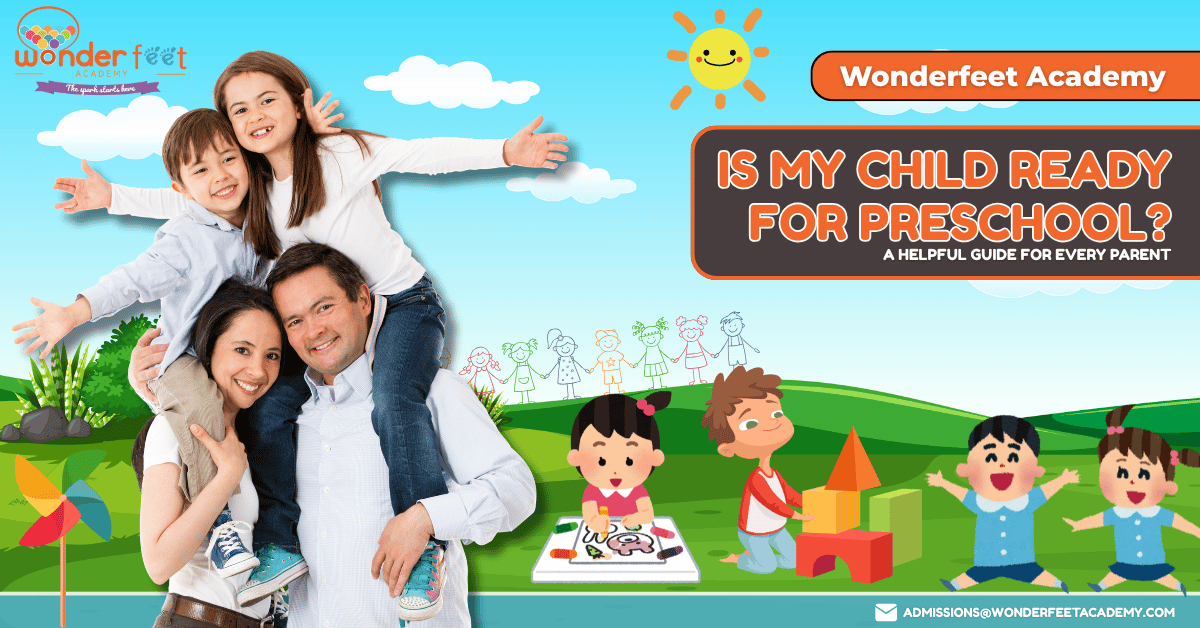
Top 10 Reasons Why Preschool Is Crucial for Your Child’s Growth Introductions:
Top 10 Reasons Why Preschool Is Crucial for Your Child’s Growth Introductions: Imagine starting to build a house without a foundation. Sounds difficult, right? Early
Looking for a preschool that nurtures curiosity and care? We’re just around the corner!
Velachery | Mambakkam | Devarajanagar | Classic Farm
09 : 00 AM - 06 : 00 PM IST
contact@wonderfeetacademy.com
+91 63800-19908


For many parents, when to start preschool can feel exciting and overwhelming. You might find yourself watching your child stack blocks or chat with a neighbor and wonder: “Are they really ready for this big step?” The truth is, preschool-age readiness isn’t just about hitting a certain birthday—it’s about a blend of physical, social, emotional, and cognitive milestones that signal your child is prepared to thrive in a structured, group setting.
Let’s explore the most telling signs your child is ready for school, along with practical advice to help you make this important decision with confidence.
Most children start preschool between ages 2 and 5, but there’s no magic number that fits every child. Readiness is about development, not just age. Some kids are eager to join a classroom at three, while others might need more time to blossom. The key is to look for a combination of abilities and behaviors that show your child is ready for the preschool adventure.
Physical readiness goes beyond being able to run and jump (though those are important!). Preschoolers should be able to manage basic self-care tasks with minimal assistance:
Gross motor skills—like climbing stairs, balancing, and jumping—help children participate in playground activities, while fine motor skills (holding crayons, stacking blocks) prepare them for classroom tasks. If your child can handle these basics, they’re likely physically ready for preschool.
Social skills are at the heart of preschool-age readiness. Preschool is a social environment, so your child should be able to:
It’s also essential that your child can separate from you for a few hours without excessive distress. Some initial tears are normal, but if your child can recover and engage with others, that’s a strong sign of readiness.
Preschoolers don’t need to have perfect self-control, but they should be able to:
Children who can ask for help, attempt new tasks, and use simple words to solve problems are showing the emotional maturity needed for preschool life.
Cognitive development is about more than knowing letters and numbers. Look for signs your child:
A child who asks questions about how things work, tells simple stories or enjoys making up songs shows the curiosity and attention span that will help them learn in a preschool setting.
Every child develops at their own pace, and it’s normal to feel uncertain when to start preschool. Here are a few tips to guide your decision:
Deciding on the right time for preschool is a significant milestone for you and your child. By looking for these signs, your child is ready for school—from self-care skills to social curiosity—you’ll be able to make a choice that feels right for your family. Remember, preschool isn’t a race; it’s about setting the stage for a lifelong love of learning at the pace that’s perfect for your little one.
Still feeling a little unsure about the perfect timing for preschool? Talking it over with experienced teachers or other parents who’ve recently been in your shoes can be incredibly helpful. Combine their wisdom with your own observations – tuning into your child’s unique cues and readiness signals will ultimately guide you to the decision that feels right for your family’s journey.

Top 10 Reasons Why Preschool Is Crucial for Your Child’s Growth Introductions: Imagine starting to build a house without a foundation. Sounds difficult, right? Early

Is My Child Ready for Preschool? Signs to Look Out For Is My Child Ready for Preschool? Signs to Look Out For For many parents,

How to Choose the Right Preschool for Your Kid: A Parent’s Guide Picking a preschool presents itself as one of the most critical choices a